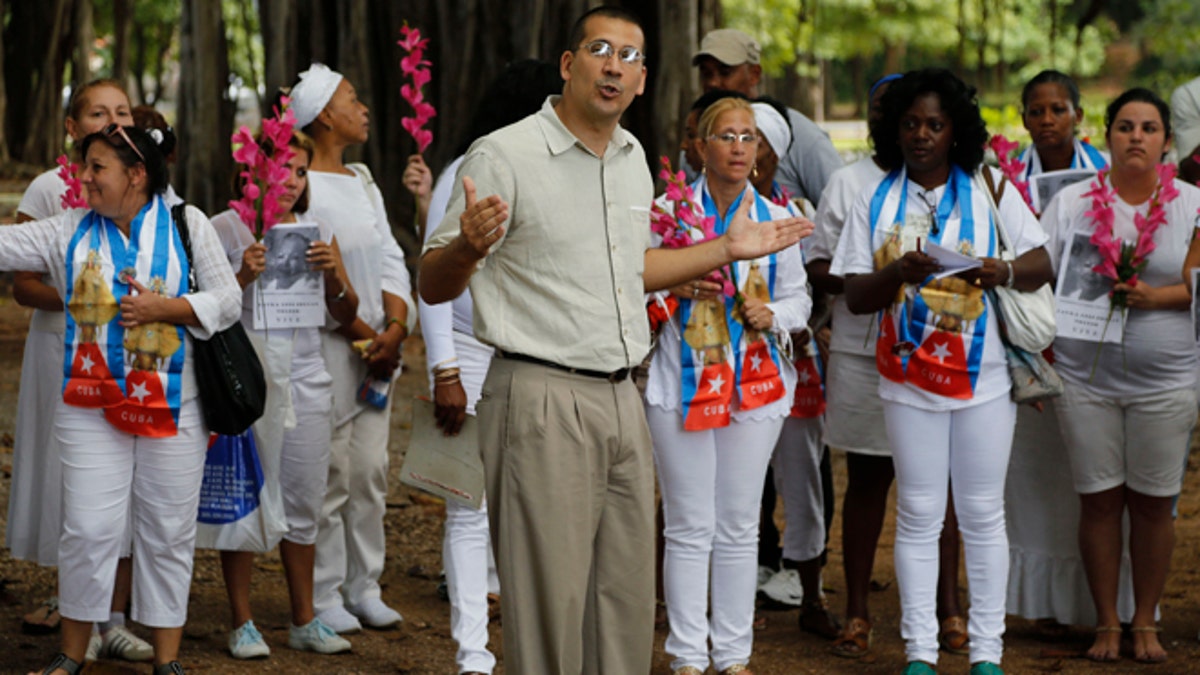
Cuban dissident Antonio Rodiles speaks during a gathering of Cuba's dissident group Ladies in White in Havana, Cuba, Sunday Dec. 28, 2014. Cubaâs government has long narrowly defined the bounds of acceptable speech, accusing many dissidents of being as agents of the U.S. government or right-wing exile groups, and subjecting them to surveillance, temporary detention and harassment. Advocates of a softer line usually receive less harsh treatment. (AP Photo/Desmond Boylan)
HAVANA (AP) – Cuban officials arrested at least three members of the political opposition Tuesday ahead of a protest art performance seen as the first major test of the government's tolerance for dissent since the declaration of detente with the United States.
Expatriate artist Tania Bruguera returned to Cuba Friday with plans to set up an open microphone for anyone to speak on the Plaza of the Revolution, a square overlooked by the president's office, military headquarters and huge portraits of revolutionary heroes Che Guevara and Camilo Cienfuegos.
Hours before the planned performance, police arrested at least three well-known dissidents and calls stopped going through to Bruguera's cellphone. Her supporters said they did not know where she was and police prevented an Associated Press reporter from approaching the door of her Havana apartment.
By 4 p.m., an hour after the scheduled protest in the symbolic heart of government authority, few people had appeared in the plaza.
Inside Cuba, where the rate of Internet usage is among the world's lowest, few ordinary citizens appeared to know about Bruguera's plans in the absence of state television, radio and newspaper coverage. Some opposition members who did know about the event said beforehand that they weren't certain about going because they saw it as unnecessarily provocative. Others said authorities had warned them to stay away.
In the end, with Bruguera absent, the event failed to materialize as promised.
The day's events appeared to be at least a short-term victory for the government of Cuban President Raúl Castro, who pledged this month that the U.S.-Cuban detente both nations announced on Dec. 17 would not lead to changes in the island's single-party system. Cuba's government has long narrowly defined the bounds of acceptable speech, accusing many dissidents of being agents of the U.S. government or right-wing exile groups, and subjecting them to surveillance, temporary detention and harassment.
President Barack Obama pledged this month that easing the embargo on Cuba and normalizing diplomatic relations would be a better way of supporting Cuban civil society. Some experts said that lessening U.S.-Cuban tensions would remove a pretext for repression of domestic critics.
But Obama also said he was "under no illusion about the continued barriers to freedom that remain for ordinary Cubans," and U.S. diplomats cautioned about expecting major short-term changes.
"Freedom of expression remains core of US policy on Cuba; we support activists exercising those rights and condemn today's detentions," Roberta Jacobson, the assistant U.S. secretary of state for Western Hemisphere affairs, tweeted on Tuesday.
Dissident Antonio Rodiles told the AP by telephone that police were taking him away around 12:30 p.m. The wife of Eliecer Avila, the 29-year-old head of moderate opposition group "Somos Mas," told the AP he had also been arrested along with Reinaldo Escobar, husband of renowned blogger Yoani Sánchez
Rodiles' group publicly supported Bruguera's performance plan. It wasn't immediately clear if Escobar and Avila had planned to attend.
Avila had told the AP Monday that he was optimistic that the warming of relations with Washington would lead to positive changes inside Cuba.
"In my case I am fully convinced that the new scenario can be positive for civil society," he said.
Like us on Facebook




